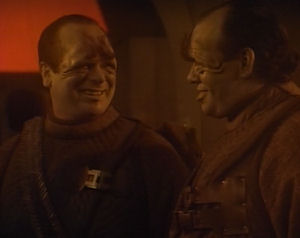| |||||||||||
| |||||||||||
|
Spoiler-free notes: Why are Data, Riker, and La Forge reassuring Wesley about the nature of the Academy entrance exams? Wesley's already taken them once, so he knows what to expect. Worf is right about being more cautious concerning the Pakleds, but Riker makes a big mistake by ignoring him. Wesley says Picard is not comfortable around him--that Picard would prefer Riker as company--but Wesley doesn't realize that Picard has already told Wesley more than he's told anyone else, including Riker, by telling him about his heart condition. Wait, when did the Klingons join the Federation again? Did they all get drunk off blood wine and join for like a day or something? The coded messages the bridge crew give to Geordi are completely incoherent. I don't know how Geordi understood it, but I guess there's specific protocol for these kinds of communications that we, as the audience, aren't really privvy to. Riker's fake-out solution reminds me of the TOS episode "The Corbomite Maneuver." It would have been a heck of a lot cooler if the doctor who saved Picard turned out to be Dr. Crusher. A couple of other Trek writers have been unfairly critical of this episode, so I feel the need to defend it. According to Dennis Russell Bailey, this episode is "the most abysmal piece of Star Trek ever filmed." He complains that the writers of "Samaritan Snare" ask questions that don't need to be asked and don't get answered (proving the ineptitude of the episode's writers), like when Worf asks why they are sending over Geordi. However, in that instance, I think the question needed to be asked and it does get answered, in that Riker's body language makes it obvious he doesn't consider the Pakleds a threat as he says that it is Starfleet duty to offer assistance. Additionally, Bailey complains about the fact that Riker doesn't directly respond to Troi's concerns, but he does, by immediately hailing the Pakleds and talking to La Forge. These instances, far from being irrelevant writing, demonstrate Riker's uncertainty in the captain's chair and help develop him as a character, help explain why he doesn't consider himself ready for his own command. He makes mistakes. Bailey then goes on to complain about the end of the episode, where Picard's operation goes horribly wrong for no reason and the only person who can save him just happens to be Dr. Pulaski. On that one, I have to agree with Bailey; that's asinine writing. More on Dennis Russell Bailey in the spoiler section... I enjoy this episode a lot, because the Pakleds amuse the hell out of me and because I think the interplay between Picard and Wesley is poignant. It's not the greatest episode of all time or anything, but it's definitely not the steaming pile of dog crap Dennis Russell Bailey thinks it is. The story Picard tells will later be shown in full detail in the excellent episode "Tapestry." Dennis Russell Bailey, along with David Bischoff and Lisa Putman White, so hated this episode that they decided to write their own episode and prove they could do better. They wrote "Tin Man." | |||||||||||
|
| |||||||||||
| |||||||||||
|
Copyright ©2011 e. magill. All rights reserved.
|

